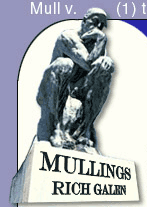|
|

|


The Secret Internet
Rich Galen
Monday November 29, 2010
Click here for an Easy Print Version
A selection of hundreds of thousands of documents - most of them classified - were released yesterday by the New York Times and several other newspapers around the world having been provided to them several weeks ago by Wikileaks.com.
It is not clear whether any of the documents the newspapers are publishing today - mostly between U.S. State Department offices and embassies - will do physical harm, but they are likely to be embarrassing and, according to the Times, "could strain relations with some countries, influencing international affairs in ways that are impossible to predict."
These documents, and a similar cache which were released several months ago, were allegedly stolen by a U.S. Army private, PFC Bradley Manning, who was an intelligence analyst serving at a base north of Baghdad.
How, you might ask, can some 22-year-old private get his hands on this much stuff? The answer is: It's all on the internet. But not the internet you're looking at now.
The U.S. Government has an internet which is completely separate from your internet. It is called the Secret Internet Protocol Router Network, but I doubt more than a few of the thousands of people who use it every day know it by that name.
It is better known as the SIPRNET (pronounced "SIP-er-net") and no one can access it unless they have a security clearance at least at the SECRET level.
I know this because while I was in Iraq I had the appropriate clearance and the occasional need to access the SIPRNET. I would go to a secure room, log in using a separate ID and password, do whatever I needed to do, log off, and leave the room.
I was told that the act of plugging a personal flash drive into a computer connected to the SIPRNET was a court-martial offense.
The Military also runs the NIPRNET (NIP-er-net), the Non-Classified Internet Protocol Router Network which is available to anyone and hooks into the internet you're using now.
There is no point - or there is supposed to be no point - where the SIPRNET and the NIPRNET intersect. SIPRNET e-mail addresses are different from the standard dot-mil e-mail address to which you can send a message. A SIPRNET e-mail address can only be reached by a person with his or her own SIPRNET e-mail address. I could not, for instance, send an e-mail to myself from my SIPRNET e-mail account to galen@mullings.com.
Thing is, I was often alone in the room with the SIPRNET terminals. I assume that someone like PFC Manning, whose job it was to troll the SIPRNET and provide analysis of intel he discovered there for the benefit of his commanders, was not closely supervised on an hour-by-hour basis.
Text documents take up very little space. The average MULLINGS column (about 750 words) uses about 90 kilobytes. The flash drive on which I keep my MULLINGS docs has a capacity of 32 gigabytes - 32 billion bytes of data. That means I could keep more than 350,000 MULLINGS columns on that one drive. Using inexpensive compression software, I could probably double that to about 750,000 documents.
Someone intent on stealing documents could easily plug in a flash drive, and download everything from the State Department's folders. A 1993 GAO report estimated there were more than 3 million people who had the appropriate clearance to access the SIPRNET. That was eight years before 9/11 so one could assume that number has at least doubled.
All it takes is one person, bent on doing harm, to download and share hundreds of thousands of documents. It appears a Private First Class sitting in an office 40 miles north of Baghdad may have been that person.
New Topic:
If you've watched television for more three minutes since Thanksgiving, you've seen and heard the new UPS "That's Logistics" commercial.
The song sounded familiar, very much like a 50's hit by Dean Martin. Thinking about that reminded me of one of my very favorite high school stunts:
Our social studies teacher was discussing how different people developed different cultures and different mores (pronounced "MORE-aze"). He asked if anyone knew what a "more" was.
I raised my hand, was called upon, stood up in the aisle, in full voce, and with fists pumping the air I sang:
"When the moon hits your eye like a big pizza pie, that's amore!"
I was, of course, dismissed from class, sent to the main office where I took my assigned seat on the vice principal's naughty bench, received a week's detention and a stern talking to.
It's my favorite exploit because of its spontaneity. Still makes me smile.
On the Secret Decoder Ring today: GREAT links today. The NY Times, the U.K. Telegraph explanation of the SIPRNET, and links to both a Dean Martin video of "That's Amore" and a video of the UPS "That's Logistics" commercial.
Also an amusing Mullfoto from my Thanksgiving trip to the Berkshire Hills and a Catchy Caption of the Day.
--END --
--END --
Copyright © 2010 Barrington Worldwide, LLC
Become a
Paid Mullings Subscriber!
(To join the FREE mailing list or to unsubscribe Click Here)

Current Issue |
Secret Decoder
Ring | Past
Issues | Email
Rich | Rich
Who?
Copyright �2007 Barrington Worldwide, LLC | Site design by Campaign
Solutions. | |
|


